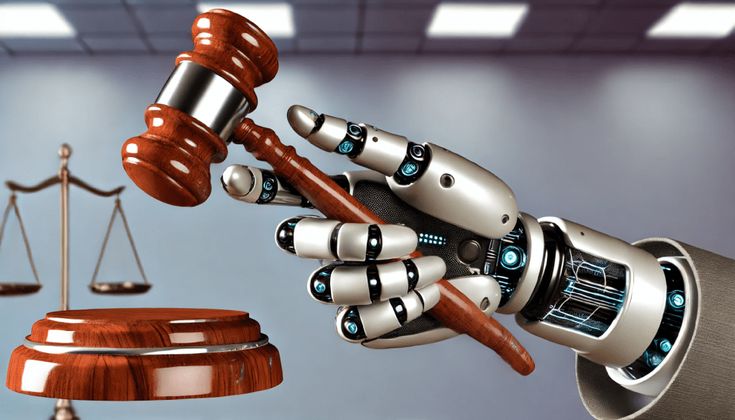Virtual paralegals and artificial intelligence (AI) are coming out as major forces altering the legal support industry. The legal industry is poised to experience a technological revolution, and this change is likely to greatly effect it. Law companies and legal departments work to increase efficiency, reduce expenses, and preserve competitiveness, therefore including virtual paralegals and artificial intelligence (AI) into legal outsourcing services is growingly usual. This blog looks at how these technological advances are changing legal support and speculates on what the future might bring.

Artificial Intelligence Integration in Legal Support
Artificial intelligence is changing legal help by offering innovative technologies that automate and enhance many aspects of legal practice. The following ways artificial intelligence is changing the business:
Contract Analysis: Technologies driven by artificial intelligence can exactly read, evaluate, and extract vital information from contracts. This includes identifying possible risks, compliance issues, and inconsistencies—all of which enable legal teams to produce better contracts and free themselves from expensive legal traps.
Virtual Assistants and Legal Chatbots: Virtual assistants and artificial intelligence-powered chatbots are become more complex. They might answer common queries, offer them quick legal knowledge, and help them navigate basic legal processes. Consequently, human workers’ load is reduced and consumer involvement is raised.
Automated Compliance Monitoring: Artificial intelligence lets legal departments be immediately alerted to changes relevant to the circumstances since it can continuously track changes in compliance standards and laws. This pre-emptive approach ensures that companies stay in compliance with always changing laws and rules, therefore reducing the possibility of running into legal issues.
E-Discovery Tools: By raising the accuracy and speed of document identification and examination, artificial intelligence has significantly enhanced e-discovery techniques. Artificial intelligence systems could more quickly than conventional techniques discover patterns, categorise texts, and highlight relevant content.
Predict Legal Analysis: Artificial intelligence could predict results and trends in the area of predictive legal analytics by analysing data from past cases. This predictive ability lets lawyers anticipate possible roadblocks, create more effective legal strategies, and offer more exact counsel to their clients.
Smart document automation: Under defined criteria and templates, artificial intelligence powered document automation systems can create, modify, and assess legal paperwork. This not only ensures that every legal document matches one another but also streamlines the production of paperwork and reduces errors.
The collaboration between AI and Virtual Paralegals
Combining virtual paralegals with artificial intelligence produces a synergistic effect that enhances the efficiency and usefulness of legal assistance systems. Legal outsourcing companies can gain from this synergy in the following ways:
Effortless Task Integration: Virtual paralegals and artificial intelligence can work together to supervise several aspects of legal support, hence enabling task integration. While artificial intelligence can automate data collecting and basic inquiry, virtual paralegals can examine results and offer in-depth analysis, so ensuring that legal activities are conducted in a thorough way.
Empirical Decision Making: By means of enormous volumes of legal data evaluation, data powered artificial intelligence can provide insights and recommendations. Virtual paralegals can apply these suggestions to produce educated decisions. This data-driven strategy increases the strategic value and accuracy of legal help.
Better Client Communication: Using artificial intelligence tools, virtual paralegals may track and control client communications, hence ensuring prompt replies and updates. Artificial intelligence-generated insights could also help to customise communication strategies to meet the specific needs and preferences of certain consumers.
Flexible and Agile Legal Services: Virtual Paralegals and Artificial Intelligence helps law firms to be more agile and adaptive to the always changing needs of their clients and the surroundings in which they operate. This adaptability enables companies to quickly respond to and grab new opportunities and challenges.
Higher Accuracy and Lower Risk: The ability of artificial intelligence to examine and examine data with exceptional accuracy helps to reduce the likelihood of errors produced by humans. When combined with the supervision and knowledge of virtual paralegals, this accuracy helps to lower legal risks and enhance the quality of legal support.
A Strategic Imperative for Legal Entities
Legal sectors should focus mostly on teaching legal teams to properly use artificial intelligence tools and include virtual paralegals into their operations. Should they succeed, they can increase their operational efficiency, offer more service to their clients, and keep their leadership position in legal innovation. In the end, the future of legal assistance is being shaped by the shifting power of virtual paralegals and artificial intelligence technologies. Apart from changing the way legal help is delivered, these technology developments are also creating fresh possibilities for customer happiness, accuracy, and efficiency. These technologies will help legal departments and law firms remain well-equipped to handle the needs of the future, which will inevitably follow continuous expansion of the legal scene.
Legal outsourcing companies that effectively combine virtual paralegals with artificial intelligence will drive the sector when it comes to providing innovative, efficient, and high-quality support. Technological developments drive the future.
